- Home
- Fyodor Dostoyevsky
Poor Folk Anthology Page 25
Poor Folk Anthology Read online
Page 25
“Imposture and shamelessness do not pay nowadays, sir. Imposture and shamelessness, sir, lead to no good, but lead to the halter. Grishka Otrepyov was the only one, sir, who gained by imposture, deceiving the blind people and even that not for long.”
In spite of this last circumstance Mr. Golyadkin proposed to wait til such time as the mask should fall from certain persons and something should be made manifest. For this it was necessary, in the first place, that office hours should be over as soon as possible, and till then our hero proposed to take no step. He knew then how he must act after taking that step, how to arrange his whole plan of action, to abase the horn of arrogance and crush the snake gnawing the dust in contemptible impotence. To allow himself to be treated like a rag used for wiping dirty boots, Mr. Golyadkin could not. He could not consent to that, especially in the present case. Had it not been for that last insult, our hero might have, perhaps, brought himself to control his anger; he might, perhaps, have been silent, have submitted and not have protested too obstinately; he would just have disputed a little, have made a slight complaint, have proved that he was in the right, then he would have given way a little, then, perhaps, he would have given way a little more, then he would have come round altogether, then, especially when the opposing party solemnly admitted that he was right, perhaps, he would have overlooked it completely, would even have been a little touched, there might even, perhaps — who could tell — spring up a new, close, warm friendship, on an even broader basis than the friendship of last night, so that this friendship might, in the end, completely eclipse the unpleasantness of the rather unseemly resemblance of the two individuals, so that both the titular councillors might be highly delighted, and might go on living till they were a hundred, and so on. To tell the whole truth, Mr. Golyadkin began to regret a little that he had stood up for himself and his rights, and had at once come in for unpleasantness in consequence.
“Should he give in,” thought Mr. Golyadkin, “say he was joking, I would forgive him. I would forgive him even more if he would acknowledge it aloud. but I won’t let myself be treated like a rag. And I have not allowed even persons very different from him to treat me so, still less will I permit a depraved person to attempt it. I am not a rag. I am not a rag, sir!”
In short, our hero made up his mind “You’re in fault yourself, sir!” he thought. He made up his mind to protest with all his might to the very last. That was the sort of man he was! He could not consent to allow himself to be insulted, still less to allow himself to be treated as a rag, and, above all, to allow a thoroughly vicious man to treat him so. No quarrelling, however, no quarrelling! Possibly if some one wanted, if some one, for instance, actually insisted on turning Mr. Golyadkin into rag, he might have done so, might have done so without opposition or punishment (Mr. Golyadkin was himself conscious of this at times), and he would have been a rag and not Golyadkin — yes, a nasty, filthy rag; but that rag would not have been a simple rag, it would have been a rag possessed of dignity, it would have been a rag possessed of feelings and sentiments, even though dignity was defenceless and feelings could not assert themselves, and lay hidden deep down in the filthy folds of the rag, still these feelings were there …
The hours dragged on incredibly slowly; at last it struck four. Soon after, all got up and, following the head of the department, moved each on his homeward way. Mr. Golyadkin mingled with the crowd; he kept a vigilant look out, and did not lose sight of the man he wanted. At last our hero saw that his friend ran up to the office attendants who handed the clerks their overcoats, and hung about near them waiting for his in his usual nasty way. The minute was a decisive one. Mr. Golyadkin forced his way somehow through the crowd and, anxious not to be left behind, he, too, began fussing about his overcoat. But Mr. Golyadkin’s friend and companion was given his overcoat first because on this occasion, too, he had succeeded, as he always did, in making up to them, whispering something to them, cringing upon them and getting round them.
After putting on his overcoat, Mr. Golyadkin junior glanced ironically at Mr. Golyadkin senior, acting in this way openly and defiantly, looked about him with his characteristic insolence, finally he tripped to and fro among the other clerks — no doubt in order to leave a good impression on them — said a word to one, whispered something to another, respectfully accosted a third, directed a smile at a fourth, gave his hand to a fifth, and gaily darted downstairs. Mr. Golyadkin senior flew after him, and to his inexpressible delight overtook him on the last step, and seized him by the collar of his overcoat. It seemed as though Mr. Golyadkin junior was a little disconcerted, and he looked about him with a helpless air.
“What do you mean by this?” he whispered to Mr. Golyadkin at last, in a weak voice.
“Sir, if you are a gentleman, I trust that you remember our friendly relations yesterday,” said our hero.
“Ah, yes! Well? Did you sleep well?”
Fury rendered Mr. Golyadkin senior speechless for a moment.
“I slept well, sir . but allow me to tell you, sir, that you are playing a very complicated game … ”
“Who says so? My enemies say that,” answered abruptly the man who called himself Mr. Golyadkin, and saying this, he unexpectedly freed himself from the feeble hand of the real Mr. Golyadkin. As soon as he was free he rushed away from the stairs, looked around him, saw a cab, ran up to it, got in, and in one moment vanished from Mr. Golyadkin senior’s sight. The despairing titular councillor, abandoned by all, gazed about him, but there was no other cab. He tried to run, but his legs gave way under him. With a look of open-mouthed astonishment on his countenance, feeling crushed and shrivelled up, he leaned helplessly against a lamp post, and remained so for some minutes in the middle of the pavement. It seemed as though all were over for Mr. Golyadkin.
Chapter 9
Everything, apparently, and even nature itself, seemed up in arms against Mr. Golyadkin; but he was still on his legs and unconquered; he felt that he was unconquered. He was ready to struggle. he rubbed his hands with such feeling and such energy when he recovered from his first amazement that it could be deduced from his very air that he would not give in. yet the danger was imminent; it was evident; Mr. Golyadkin felt it; but how to grapple with it, with this danger? — that was the question. the thought even flashed through Mr. Golyadkin’s mind for a moment, “After all, why not leave it so, simply give up? Why, what is it? Why, it’s nothing. I’ll keep apart as though it were not I,” thought Mr. Golyadkin. “I’ll let it all pass; it’s not I, and that’s all about it; he’s separate too, maybe he’ll give it up too; he’ll hang about, the rascal, he’ll hang about. He’ll come back and give it up again. Than’s how it will be! I’ll take it meekly. And, indeed, where is the danger? Come, what danger is there? I should like any one to tell me where the danger lies in this business. It is a trivial affair. An everyday affair . ”
At this point Mr. Golyadkin’s tongue failed; the words died away on his lips; he even swore at himself for this thought; he convicted himself on the spot of abjectness, of cowardice for having this thought; things were no forwarder, however. He felt that to make up his mind to some course of action was absolutely necessary for him at the moment; he even felt that he would have given a great deal to any one who could have told him what he must decide to do. Yes, but how could he guess what? Though, indeed, he had no time to guess. In any case, that he might lose no time he took a cab and dashed home.
“Well? What are you feeling now?” he wondered; “what are you graciously pleased to be thinking of, Yakov Petrovitch? What are you doing? What are you doing now, you rogue, you rascal? You’ve brought yourself to this plight, and now you are weeping and whimpering!”
So Mr. Golyadkin taunted himself as he jolted along in the vehicle. To taunt himself and so to irritate his wounds was, at this time, a great satisfaction to Mr. Golyadkin, almost a voluptuous enjoyment.
“Well,” he thought, “if some magician were to turn up now, or if it could come to pass in some of
ficial way and I were told: ‘Give a finger of your right hand, Golyadkin — and it’s a bargain with you; there shall not be the other Golyadkin, and you will be happy, only you won’t have your finger’ — yes, I would sacrifice my finger, I would certainly sacrifice it, I would sacrifice it without winking. The devil take it all!” the despairing titular councillor cried at last. “Why, what is it all for? Well, it all had to be; yes, it absolutely had to; yes, just this had to be, as though nothing else were possible! And it was all right at first. Every one was pleased and happy. But there, it had to be! There’s nothing to be gained by talking, though; you must act.”
And so, almost resolved upon some action, Mr. Golyadkin reached home, and without a moment’s delay snatched up his pipe and, sucking at it with all his might and puffing out clouds of smoke to right and to left, he began pacing up and down the room in a state of violent excitement. Meanwhile, Petrushka began laying the table. At last Mr. Golyadkin made up his mind completely, flung aside his pipe, put on his overcoat, said he would not dine at home and ran out of the flat. Petrushka, panting, overtook him on the stairs, bringing the hat he had forgotten. Mr. Golyadkin took his hat, wanted to say something incidentally to justify himself in Petrushka’s eyes that the latter might not think anything particular, such as, “What a queer circumstance! here he forgot his hat — and so on,” but as Petrushka walked away at once and would not even look at him, Mr. Golyadkin put on his hat without further explanation, ran downstairs, and repeating to himself that perhaps everything might be for the best, and that affairs would somehow be arranged, though he was conscious among other things of a cold chill right down to his heels, he went out into the street, took a cab and hastened to Andrey Filippovitch’s.
“Would it not be better tomorrow, though?” thought Mr. Golyadkin, as he took hold of the bell-rope of Andrey Filippovitch’s flat. “And, besides, what can I say in particular? There is nothing particular in it. It’s such a wretched affair, yes, it really is wretched, paltry, yes, that is, almost a paltry affair . yes, that’s what it is, the incident . Suddenly Mr. Golyadkin pulled at the bell; the bell rang; footsteps were heard within . Mr. Golyadkin cursed himself on the spot for his hastiness and audacity. His recent unpleasant experiences, which he had almost forgotten over his work, and his encounter with Andrey Filippovitch immediately came back into his mind. But by now it was too late to run away: the door opened. Luckily for Mr. Golyadkin he was informed that Andrey Filippovitch had not returned from the office and had not dined at home.
“I know where he dines: he dines near the Ismailovsky Bridge,” thought our hero; and he was immensely relieved. To the footman’s inquiry what message he would leave, he said: “It’s all right, my good man, I’ll look in later,” and he even ran downstairs with a certain cheerful briskness. Going out into the street, he decided to dismiss the cab and paid the driver. When the man asked for something extra, saying he had been waiting in the street and had not spared his horse for his honour, he gave him five kopecks extra, and even willingly; and then walked on.
“It really is such a thing,” thought Mr. Golyadkin, “that it cannot be left like that; though, if one looks at it that way, looks at it sensibly, why am I hurrying about here, in reality? Well, yes, though, I will go on discussing why I should take a lot of trouble; why I should rush about, exert myself, worry myself and wear myself out. To begin with, the thing’s done and there’s no recalling it . of course, there’s no recalling it! Let us put it like this: a man turns up with a satisfactory reference, said to be a capable clerk, of good conduct, only he is a poor man and has suffered many reverses — all sorts of ups and downs — well, poverty is not a crime: so I must stand aside. Why, what nonsense it is! Well, he came; he is so made, the man is so made by nature itself that he is as like another man as though they were two drops of water, as though he were a perfect copy of another man; how could they refuse to take him into the department on that account? If it is fate, if it is only fate, if it only blind chance that is to blame — is he to be treated like a rag, is he to be refused a job in the office? Why, what would become of justice after that? He is a poor man, hopeless, downcast; it makes one’s heart ache: compassion bids one care for him! Yes! There’s no denying, there would be a fine set of head officials, if they took the same view as a reprobate like me! What an addlepate I am! I have foolishness enough for a dozen! Yes, yes! They did right, and many thanks to them for being good to a poor, luckless fellow . Why, let us imagine for a moment that we are twins, that we had been born twin brothers, and nothing else — there it is! Well, what of it? Why, nothing! All the clerks can get used to it . And an outsider, coming into our office, would certainly find nothing unseemly or offensive in the circumstance. In fact, there is really something touching it; to think that the divine Providence created two men exactly alike, and the heads of the department, seeing the divine handiwork, provided for two twins. It would, of course,” Mr. Golyadkin went on, drawing a breath and dropping his voice, “it would, of course . it would, of course, have been better if there had been . if there had been nothing of this touching kindness, and if there had been no twins either . The devil take it all! And what need was there for it? And what was the particular necessity that admitted of no delay! My goodness! The devil has made a mess of it! Besides, he has such a character, too, he’s of such a playful, horrid disposition — he’s such a scoundrel, he’s such a nimble fellow! He’s such a toady! Such a lickspittle! He’s such a Golyadkin! I daresay he will misconduct himself; yes, he’ll disgrace my name, the blackguard! And now I have to look after him and wait upon him! What an infliction! But, after all, what of it? It doesn’t matter. Granted, he’s a scoundrel, well, let him be a scoundrel, but to make up for it, the other one’s honest; so he will be a scoundrel and I’ll be honest, and they’ll say that this Golyadkin’s a rascal, don’t take any notice of him, and don’t mix him up with the other; but the other one’s honest, virtuous, mild, free from malice, always to be relied upon in the service, and worthy of promotion; that’s how it is, very good . but what if . what if they get us mixed up! He is equal to anything! Ah, Lord, have mercy upon us! He will counterfeit a man, he will counterfeit him, the rascal — he will change one man for another as though he were a rag, and not reflect that a man is not a rag. Ach, mercy on us! Ough, what a calamity!” …
Reflecting and lamenting in this way, Mr. Golyadkin ran on, regardless of where he was going. He came to his senses in Nevsky Prospect, only owing to the chance that he ran so neatly full-tilt into a passer-by that he saw stars in his eyes. Mr. Golyadkin muttered his excuses without raising his head, and it was only after the passer-by, muttering something far from flattering, had walked a considerable distance away, that he raised his nose and looked about to see where he was and how he had got there. Noticing when he did so that he was close to the restaurant in which he had sat for a while before the dinner-party at Olsufy Ivanovitch’s, our hero was suddenly conscious of a pinching and nipping sensation in his stomach; he remembered that he had not dined; he had no prospect of a dinner-party anywhere. And so, without losing precious time, he ran upstairs into the restaurant to have a snack of something as quickly as possible, and to avoid delay by making all the haste he could. And though everything in the restaurant was rather dear, that little circumstance did not on this occasion make Mr. Golyadkin pause, and, indeed, he had no time to pause over such a trifle. In the brightly lighted room the customers were standing in rather a crowd round the counter, upon which lay heaps of all sorts of such edibles as are eaten by well-bred person’s at lunch. The waiter scarcely had time to fill glasses, to serve, to take money and give change. Mr. Golyadkin waited for his turn and modestly stretched out his had for a savoury patty. Retreating into a corner, turning his back on the company and eating with appetite, he went back to the attendant, put down his plate and, knowing the price, took out a ten-kopeck piece and laid the coin on the counter, catching the waiter’s eye as though to say, “Look, here’s the money, one pie,”
and so on.
“One rouble ten kopecks is your bill,” the waiter filtered through his teeth.
Mr. Golyadkin was a good deal surprised.
“You are speaking to me? I . I took one pie, I believe.”
“You’ve had eleven,” the man said confidently.
“You . so it seems to me . I believe, you’re mistaken . I really took only one pie, I think.”
“I counted them; you took eleven. Since you’ve had them you must pay for them; we don’t give anything away for nothing.”
Mr. Golyadkin was petrified. “What sorcery is this, what is happening to me?” he wondered. Meanwhile, the man waited for Mr. Golyadkin to make up his mind; people crowded round Mr. Golyadkin; he was already feeling in his pocket for a silver rouble, to pay the full amount at once, to avoid further trouble. “Well, if it was eleven, it was eleven,” he thought, turning as red as a lobster. “Why, a man’s hungry, so he eats eleven pies; well, let him eat, and may it do him good; and there’s nothing to wonder at in that, and there’s nothing to laugh at . ”
At that moment something seemed to stab Mr. Golyadkin. He raised his eyes and — at once he guessed the riddle. He knew what the sorcery was. All his difficulties were solved …
In the doorway of the next room, almost directly behind the waiter and facing Mr. Golyadkin, in the doorway which, till that moment, our hero had taken for a looking-glass, a man was standing — he was standing, Mr. Golyadkin was standing — not the original Mr. Golyadkin, the hero of our story, but the other Mr. Golyadkin, the new Mr. Golyadkin. The second Mr. Golyadkin was apparently in excellent spirits. He smiled to Mr. Golyadkin the first, nodded to him, winked, shuffled his feet a little, and looked as though in another minute he would vanish, would disappear into the next room, and then go out, maybe, by a back way out; and there it would be, and all pursuit would be in vain. In his hand he had the last morsel of the tenth pie, and before Mr. Golyadkin’s very eyes he popped it into his mouth and smacked his lips.

 The Eternal Husband
The Eternal Husband Crime and Punishment
Crime and Punishment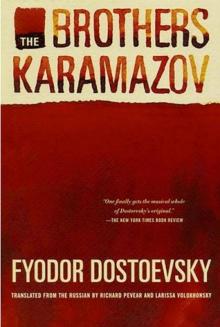 The Brothers Karamazov
The Brothers Karamazov Notes From Underground
Notes From Underground The Idiot
The Idiot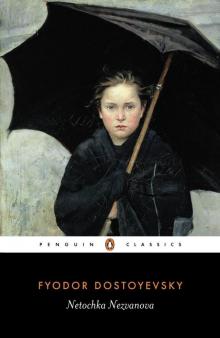 Netochka Nezvanova (Penguin ed.)
Netochka Nezvanova (Penguin ed.)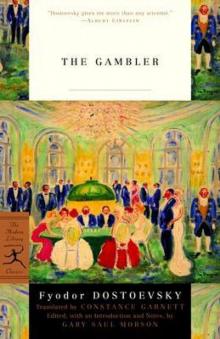 The Gambler
The Gambler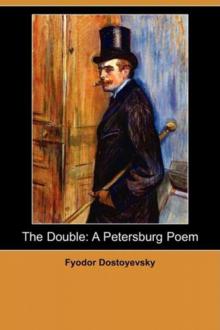 The Double
The Double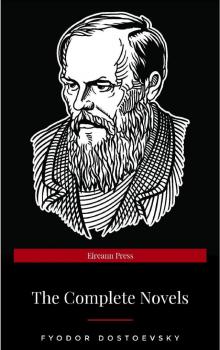 Poor Folk Anthology
Poor Folk Anthology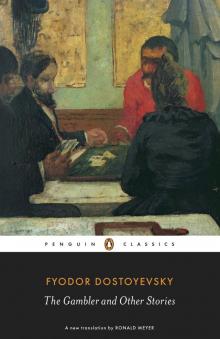 The Gambler and Other Stories (Penguin ed.)
The Gambler and Other Stories (Penguin ed.) Prestuplenie i nakazanie. English
Prestuplenie i nakazanie. English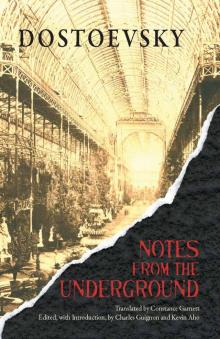 Notes from the Underground
Notes from the Underground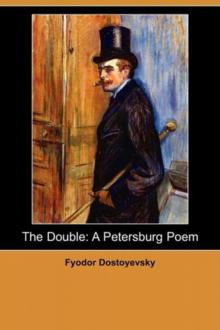 The Double: A Petersburg Poem
The Double: A Petersburg Poem White Nights and Other Stories / The Novels of Fyodor Dostoevsky, Volume X
White Nights and Other Stories / The Novels of Fyodor Dostoevsky, Volume X Complete Works of Fyodor Dostoyevsky
Complete Works of Fyodor Dostoyevsky Poor Folk and Other Stories
Poor Folk and Other Stories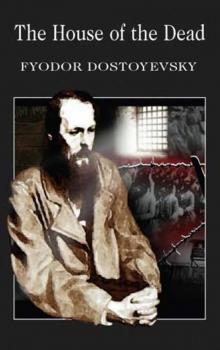 The House of the Dead
The House of the Dead